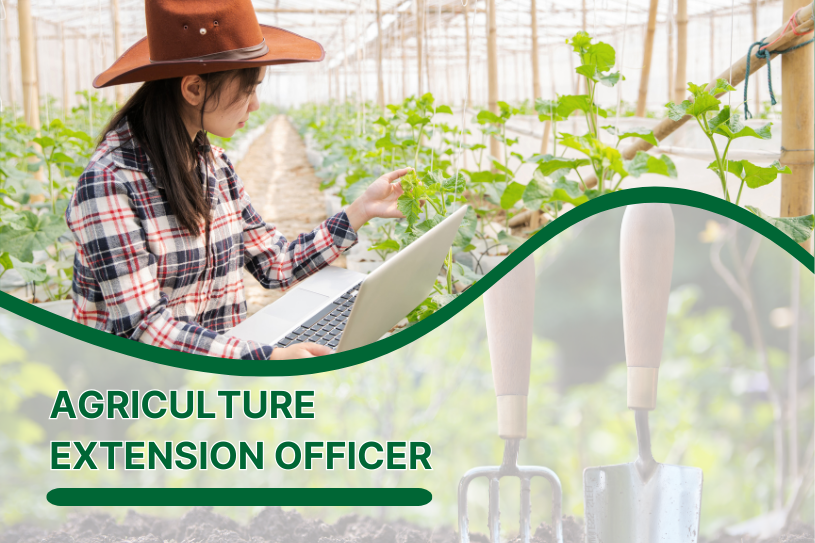In the vast and ever-changing farming landscape farming, farmers are often faced with a myriad of issues that could affect the productivity of crops, the health of livestock, and the overall efficiency of their farms. This article will highlight five typical problems faced by farmers and give helpful advice from the point of view of the position of an Agriculture Extension Officer. They are the advocates of sustainable and efficient agriculture practices, they are essential in assisting farmers and dealing with their challenges.
The Crucial Role of Agriculture Extension Officer
An Agriculture Extension Officer serves as an interface between researchers in the field and farmers, making sure that the latest practices and innovations are implemented in the field. They are more than just conventional farming leads. the major responsibilities of the Agriculture Extension Officer are as teachers in the field, facilitators, and promote sustainability in agriculture. We’ll explore the ways that these officials provide beneficial information to farmers. They begin by establishing the basis of successful farming: soil health.
Soil Health Management
Understanding Soil Composition
One of the most difficult problems farmers face is keeping good soil health. Agriculture Extension officials stress the significance of knowing the soil’s composition by conducting regular tests of soil. When analyzing levels of nutrients in addition to pH levels and the organic matter in the soil, agriculturalists will be able to be more informed about fertilization and strategies for soil amendment.
Implementing Crop Rotation
Crop rotation is a crucial method that is recommended by Agriculture Extension Officers to mitigate problems with soil health. The cultivation of different crops throughout seasons aids in breaking the cycle of disease and pests improves the soil’s structure and helps prevent depletion of nutrients. This approach is sustainable and helps to ensure long-term soil fertility.
Precision Agriculture Techniques
Implementing precision agriculture is a different method for efficient sustainable soil management. An Agriculture Extension Officer promotes using modern technology including GPS-guided tractor systems as well as sensor-based irrigation for optimal use of resources. This ensures that crop plants get the proper quantity of nutrients and water and helps to ensure sustainable soils.
Pest and Disease Management
Integrated Pest Management (IPM)
Insect and disease outbreaks can dramatically affect the yields of crops. Agriculture Extension Agents suggest Integrated Pest Management (IPM) as an integrated method. It involves the combination of biological control along with cultural practices and the use of pesticides in a responsible manner to reduce the effect on beneficial species and the natural environment.
Early Detection and Monitoring
Early detection of pests or disease-related symptoms is essential. An Agriculture Extension officer stresses the necessity of routine inspections of fields. Farmers need to be educated on how to recognize early indicators of pests and allow for rapid intervention. The early detection of pests reduces the requirement for the use of a large amount of pesticides and reduces the risk of crop damage.
Crop Diversity for Resilience
The promotion of diversity in crops can be a great defense against disease and pests. It is important to encourage the agriculture Extension Officer to encourage farmers to diversify their crop varieties since monocultures are more prone to widespread infestations. The addition of companion plantings and the maintenance of biodiversity on the farm form an ecosystem that naturally manages insect populations.
Water Management
Efficient Irrigation Practices
The issue of water scarcity is an important problem in agriculture. Agriculture Extension officers advocate for effective irrigation methods including rainwater harvesting or drip irrigation. These practices not only save water but also guarantee that crops are provided with enough water for maximum growth.
Soil Moisture Monitoring
Monitoring the soil’s humidity levels is crucial to successfully managing water. The Agriculture Extension Officer recommends the installation of soil moisture sensors to decide the best time and amount of water needed to be applied. This method of precision prevents excessive irrigation and helps conserve water resources.
Water Recycling and Reuse
In areas that are experiencing water shortages, Agriculture Extension Officers promote the reuse and recycling of water. Recycling and treating water to irrigate reduces the dependence on external sources of water and helps sustain environmentally sustainable agriculture methods.
Market Access and Diversification
Connecting Farmers to Markets
Farmers frequently struggle to access market prices for their goods. The Agriculture Extension Officer plays an important part in connecting market traders and farmers. It involves forming farmer cooperatives, sharing market data, and encouraging the use of fair trading procedures.
Value-Added Products
To increase opportunities for market entry, Agriculture Extension Officers encourage farmers to look into value-added items. Making raw agricultural products into products such as jams, juices, and organic products adds value and creates markets that are not previously available. The diversification reduces dependence on fluctuating prices for commodities.
Training in Entrepreneurship
Providing farmers with entrepreneurial abilities is crucial to successful market entry. The Agriculture Extension Officer holds seminars on strategy for marketing, business planning, and the management of finances. Ensuring farmers can manage the commercial aspects of farming helps them thrive in a highly competitive market.
Climate Change Resilience
Crop Selection and Adaptation
Climate change is a danger to the productivity of crops. Agriculture Extension officers recommend 50 ways to reduce climate change such as choosing cultivars that are climate resilient and able to adapt to the changing climate. This method of proactive selection ensures the crops can withstand fluctuations in temperature or unpredictable rain, as well as other challenges related to climate.
Agroforestry Practices
The integration of agroforestry into agricultural systems increases the resilience of climate. Agriculture Extension officers promote the plantation of trees in conjunction with crops to shade them as well as conserve water and increase the soil’s structure. Agroforestry techniques help to increase biodiversity and also generate microclimates for crops.
Education on Sustainable Practices
Agriculture Extension officers emphasize that it is important to educate farmers about sustainable farming practices. They also promote conservation tillage and cover cropping as well as agroecological methods. By adopting strategies that improve soil health while reducing the environmental footprint, farmers can increase their resilience to the adverse effects of climate change.
Conclusion
To navigate the challenges in modern agriculture the job of an Agriculture Extension officer is crucial. Through addressing issues with soil health, and disease control as well as the efficiency of water, access to markets as well as climate change adaptation they provide invaluable assistance for farmers. Applying their advice in practical ways does more than just solve common agricultural issues. It also helps in the establishment of a more sustainable and robust agriculture system. By collaborating and sharing knowledge farmers will be able to conquer obstacles and grow a flourishing agriculture sector.










